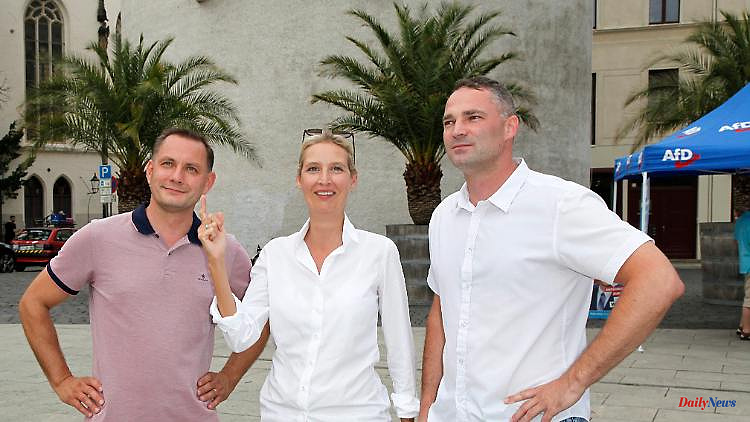For the first time, the AfD could conquer a district office. This should also affect the mood and power struggle within the federal AfD. Also affected would be: Saxony, Prince Kretschmer and the still freshly incumbent CDU party leader Merz.
Sunday will be a good day for the AfD. After the party had to accept losses in three state elections in a row and a conflict-ridden federal party conference is coming up in a week, the voters in Saxony are finally making the right-wing party happy again. She can count on numerous successes in the election of nine district administrators and 200 mayors of cities and communities, even with a historic one: the first district office in AfD hands. Several AfD district administrator candidates should at least make it into the runoff election, including in the Görlitz district. There it could even be enough for the candidate Sebastian Wippel in the first ballot.
The member of the state parliament Wippel had already achieved the most votes in the election of the mayor of the city of Görlitz in 2019 with around 36 percent and could only be prevented because the other major parties supported the CDU candidate Octavian Ursu in the second ballot. In the district of Görlitz, it could now be enough for the police commissioner, who looks like a pallbearer in his black suit and black tie on his election poster - "Together for home and future".
A first-time AfD district administrator would be of great importance for the district and the party, says Wippel in an interview with RTL and ntv. "Then we can also prove what we can do. That also contributes to normalization to a certain extent," says Wippel. "It's not as if everyone is a right-wing extremist in this district. That's complete nonsense, the picture that's always being drawn. I believe that that's not the case."
Establishing itself as a normal party is a long-term project of the AfD, which is repeatedly conspicuous for its radical right-wing statements and connections to right-wing extremists, and which has long been dominated by its völkisch wing. In no other federal state has it made as much progress as in Saxony, where, according to an INSA survey from the beginning of April, 28 percent of those questioned would vote for AfD in a state election. It is three percentage points ahead of the CDU and well ahead of all other parties.
But state elections are only four years away, local elections are now. And because the district administrators are only elected every seven years - in the spring of 2015 the AfD in Saxony was still a small party - the state party throws everything in. Six district administrator candidates are members of the state parliament, of which, in addition to Wippel, the Central Saxony candidate Frank Peschel and Bautzen candidate Rolf Weigand belong to the parliamentary group executive committee. The party sends experienced and well-known men, also at the price that it could not compensate for possible departures of elected district administrators from the parliamentary group: Due to an incorrect list of candidates in the last state election, the AfD has no successors up its sleeve. The faction would shrink accordingly.
But it's not just about normalizing the party. District administrators are usually respected figures in their circles with a wealth of power competencies. "In this way, they also determine civil society projects and decide on budgets; if necessary, they can stamp out unloved projects," warns the Amadeu Antonio Foundation. Projects for diversity and tolerance are threatened, although more of them are actually needed in Saxony, "and not less".
The scientist Gert Pickel, deputy director of the Leipzig competence center for right-wing extremism and democracy research, considers the AfD to be anchored in Saxony with an electorate of "around 27 percent". "Actually, the AfD can expect good results across the board," says Pickel about the upcoming local elections. AfD brand cores such as anti-Islamic and anti-feminist positions continue to appeal to the core electorate.
In the district election, many positions are not specific to the AfD: the AfD candidates are very concerned with local issues such as public infrastructure, the expansion of public transport, medical care, against the privatization of municipal property, ideas against the slowed down but not stopped Emigration from the rural areas of Saxony. In addition - with the Saxon AfD even more than with western state associations - there is a sharp rejection of the Corona policy of recent years.
The candidate for the district office of the Vogtland district, Roberto Rink, like Wippel, does not want to enforce the institution-related vaccination requirement. All AfD district administrator candidates advertise together with the claim "Healthy without compulsion". However, the AfD is also under pressure because it is under pressure from the right.
The small party Freie Sachsen, classified as right-wing extremist, which emerged from the Corona protests, which are particularly popular in Saxony, is running its own candidates in the Erzgebirge district and in the Saxon Switzerland-Eastern Ore Mountains district, while supporting the AfD candidates elsewhere. Both districts are former NPD strongholds, now Free Saxony and AfD are stealing votes from each other there in favor of the CDU. The Christian Democrats, who are legendary in Saxony, have so far occupied all ten district offices and their dominance is being challenged by the AfD.
For Saxony's Prime Minister Michael Kretschmer, who has to govern with the SPD and Greens because of the strong AfD, the local elections are a pointer: Are the bulwarks of the other parties holding up against the right? In his state association, voices are repeatedly raised that want to tear down the CDU firewall to the AfD and want to cooperate with the AfD. Together, both parties have a majority of almost two-thirds of all votes in the country. Many CDU members feel closer to the AfD than the Greens who rule with them. If the Christian Democrats lose influential and ornate district offices to the AfD, voices are likely to increase that question Kretschmer's course of demarcation.
Because there is so much at stake for the CDU, the federal party chairman Friedrich Merz will come to Saxony on Saturday to conclude the election campaign. The East CDU associations in particular had hoped that the former Merkel opponent would have more appeal among conservative voters. This effect is also being put to the test on Sunday, after the CDU won the two more important of three state elections in the west in the spring.
At the weekend, neighboring Thuringia will also elect numerous new mayors. In the federal state, the CDU could for the first time, with the help of the AfD, push through a law against the accelerated expansion of wind power against the other parties. Shortly after taking office, Merz is threatened with a crisis like that of his predecessor Annegret Kramp-Karrenbauer in February 2020, who was unable to prevent Thomas Kemmerich from being elected head of government in Thuringia by the AfD, CDU and FDP.
Despite the recent election defeats and the observation by the Office for the Protection of the Constitution, things are going well for the AfD in Saxony and Thuringia. Federal party spokesman Tino Chrupalla would also like to send out this signal on Sunday evening, who is coming to his home town of Görlitz on Saturday to conclude the AfD election campaign. A week later, at the federal party conference in Riesa, Chrupalla is threatened with being voted out. Because the party has lost feathers in the west and many members there see themselves more as liberal-conservative than as nationalist, Chrupalla has recently encountered headwinds. If Görlitz candidate Wippel or another AfD'ler gets a district office for the party, it would be clearer than ever: The AfD is a power in the East, and the course of the AfD is determined by the powerful there.












